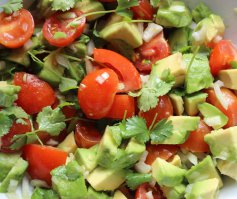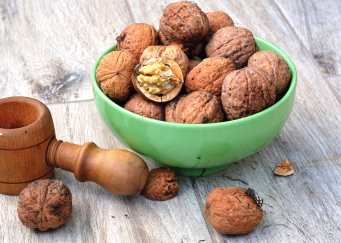 Magnesium is an element of strategic importance for our body. It takes part in the photosynthesis process and activates more than 320 enzymes necessary for human energy production. It is this element that determines the condition of our skeletal, nervous, digestive and circulatory systems.
Magnesium is an element of strategic importance for our body. It takes part in the photosynthesis process and activates more than 320 enzymes necessary for human energy production. It is this element that determines the condition of our skeletal, nervous, digestive and circulatory systems.
Properties of magnesium
 The best known feature of magnesium is its beneficial effect on the nervous system. This element provides relaxation, calmness and thus more efficient work of the body. In stressful situations, magnesium triggers the process of adrenaline secretion, which enhances the body's efficiency and increases the ability to take appropriate reactions.
The best known feature of magnesium is its beneficial effect on the nervous system. This element provides relaxation, calmness and thus more efficient work of the body. In stressful situations, magnesium triggers the process of adrenaline secretion, which enhances the body's efficiency and increases the ability to take appropriate reactions.
Magnesium has a very beneficial effect on the cardiovascular system. Administration of magnesium promotes convalescence after myocardial infarction, prevents heart arrhythmia and the formation of blood clots. The presence of magnesium is conducive to lowering blood pressure. This element has an antiatherosclerotic effect, reduces the amount of so-called "bad" cholesterol and supports the accumulation of HDL cholesterol (positively influencing the body).

Magnesium prevents menstrual tension in women, it is useful in reducing breast hypersensitivity and treating persistent headaches. In men, on the other hand, it inhibits the growth of the prostate.
Women should take increased doses of this element 3-4 months before becoming pregnant. In this way, they will provide the right level of protection against muscle hypertension and reduce the risk of miscarriage.
Magnesium ensures the proper functioning of the immune system, especially the thymus.
It also protects our organisms against cancer. Its use reduces the risk of cancer of the skin, oral cavity, breast or cancer caused by smoking.
Magnesium affects metabolism and prevents the formation of gallstones.
It is also worth mentioning the detoxification effect. This element is also helpful in various types of allergies and inflammations.
Symptoms of magnesium deficiency
The most common symptoms of magnesium deficiency include: muscle cramps (especially calves), eyelid trembling, painful menstruation, migraine, lack of concentration, apathy, sleep disorders, memory problems.
In adolescents the lowered level of this element is quite a frequent phenomenon. It is important to pay attention to this, as magnesium deficiency may be the cause of poor learning outcomes and behavioural problems (hyperactivity, aggression, deconcentration).
Presence of magnesium
 Before we reach for supplements, we should first of all increase the amount of food containing magnesium. These include beans, peaches, avocados, bananas, garlic, figs, grapefruits, apricots, sesame seeds, soya beans, tofu, whole almonds, nuts, molasses, beer yeast, brown rice, groats.
Before we reach for supplements, we should first of all increase the amount of food containing magnesium. These include beans, peaches, avocados, bananas, garlic, figs, grapefruits, apricots, sesame seeds, soya beans, tofu, whole almonds, nuts, molasses, beer yeast, brown rice, groats.
Magnesium contains a lot of fresh vegetables, mainly: kale, sauerkraut, botvin, parsley, sorrel and watercress.
Another source of magnesium can be dried fruits and herbs, including skylight, camomile, cayenne pepper, fenugreek, hops, horsetail, lemon grass, liquorice, nettle, mint, paprika and sage.
Traces can be found in milk and meat.
When is it worth increasing the dose of magnesium?
An adequate level of magnesium should be ensured in states of increased load on the body. Children and adolescents, people working physically or athletes are particularly susceptible to the loss of this element. Among the situations requiring higher doses of this element, one can mention it:
- fast, drastic slimming diets,
- prolonged use of medication,
- prolonged stress,
- Excessive workload,
- excessive drinking of coffee, alcohol,
- use of drugs and anabolic agents,
- use of medicines (antibiotics, cytostats, sedatives, psychotropic drugs, sleeping pills and oral contraceptives.
One element is not enough

Experts devote much attention to the need to provide the body with a full range of vitamins and minerals. At the same time, care should be taken to consume these in the form of food and not various supplements.
The food and the ingredients contained in it will effectively protect against general weakness of the body. The most important are elements and antioxidants.
Low molecular antioxidants include vitamin C, bioflavones from tea and citrus, N-acetyocysteine, sulfuric acids, cysteine, methionine and glutathione, which is essential for cleansing the body.
Vitamin A (beta-carotene), vitamin E and vitamin D provide excellent protection against cell fatigue and aging.
Bioflavones are found in plants, mainly in lemon and tea. Citruses are the most bioflavones concentrated in the skin. In principle, it should be cleaned and consumed together with the rest of the fruit. Let's also be careful not to give lemons in tea, because the acid contained in it causes the release of toxic alumina from tea. Other fruits that contain bioflavones include apples, apricots, peaches and mandarins.
In addition to bioflavones, it is worth eating foods containing resveratol (red grapes), carotenoids (tomatoes, peppers, some cabbage vegetables).















